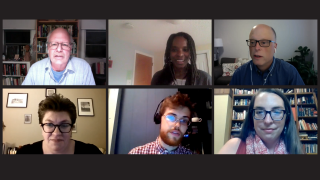Webinar Asks Are We Imperial Faith
By Rob Kipp
For five weeks in the fall of 2020, the International Unitarian/Universalist Joint Working Group (Unitarian Universalist Association International Office, the International Council of Unitarians and Universalists, and the UU Partner Church Council) hosted a five-part webinar series that posed the question: Are we an imperial faith?
We cordially invite you to view the recorded sessions and peruse their associated materials.
The webinar invited participants to explore and understand the role that North American Unitarians, Universalists, and Unitarian Universalists have played abroad, with particular attention to our participation in colonial enterprises. We reflected on the complex power structures in play during international and cross-cultural engagement, in the past as well as the present, in order to avoid making the same mistakes as our colonial forebears. We aimed to make space for curiosity and humility, for an awareness that we’re all on a road of learning together.
Session 1 was led by Rev. Fred Muir, UU Partner Church Council Interim Executive Director. Rev. Muir took us through a brief history of North American U/U imperialism and the theological elements that justified imperial involvement at the time. He invited us to consider (using hymns as examples) how an imperial mindset lingers in North American UU theology and practice today.
Rev. Roger Bertschausen—former UU Partner Church Council Executive Director—facilitated Session 2, where we discussed the vein of “spiritual Darwinism” that runs through NA UUism: the belief that North American UUs are “further along the evolutionary path” than other faith groups, even other U/U groups around the world. To what extent does this branch of UUism privilege oneness and unity over an embrace of diversity? Rev. Bertschausen invited participants to reflect on who is being referred to when we sing and speak of the one-ness of humanity, as in the hymn “We Would Be One.” Who is “we”? What does “one” look and feel like?
Session 3 was helmed by Rev. Sara Ascher, International Council of Unitarians and Universalists Executive Director. Central to Rev. Ascher’s session was an examination of Singing the Living Tradition’s Responsive Reading #584, “Network of Mutuality” by Rev. Dr. Martin Luther King, Jr. Rev. Ascher showed how the lines of the reading had been taken (out of context) from several King sources. We discussed how the decontextualization is used in Unitarian Universalist congregations and how it shapes our understanding of King’s sentiments.
Rev. Alicia R. Forde—Unitarian Universalist Association International Office Director—led Session 4, applying some of the prior weeks’ framing and theories to real-world situations that Unitarian Universalists have had to consider. Rev. Forde invited us to imagine two scenarios—each tied up in unequal power relationships, if not outright imperialism—and how best a North American UU might respond in such situations.
The final session was a wrap-up discussion of the threads tugged on throughout the series.
The conversation is certainly not over. This conversation is one of many that seeks to respond to the call of the UUA Commission on Institutional Change to live more fully into our faith’s principles of inclusion, equity, and justice. We hope that you and others in your circle will engage with the questions raised in the series, and we look forward to continuing the discussion—in some new form—down the road.
